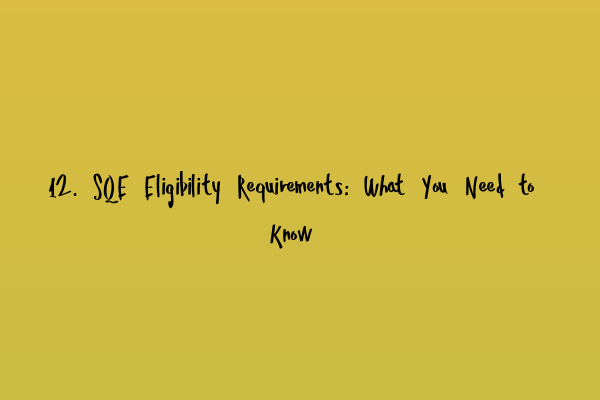12. SQE Eligibility Requirements: What You Need to Know
Welcome to our comprehensive guide to the Solicitors Qualifying Examination (SQE) eligibility requirements. If you’re considering a career in law and are interested in qualifying as a solicitor in England and Wales, understanding the eligibility criteria for the SQE is crucial. In this article, we’ll provide you with all the information you need to know to determine whether you are eligible to sit for the SQE exams.
1. Academic Qualifications
The first eligibility requirement for the SQE is to have a degree or equivalent qualification. The SQE does not specify a particular subject for your degree, and any undergraduate or postgraduate degree is acceptable. However, if you have completed a law degree, you may be exempt from some of the SQE assessments. For more information on the exemptions available for law degree holders, check out our article on SQE 1 Preparation Courses.
2. English Language Skills
Proficiency in the English language is essential for success in the legal profession. To meet the eligibility requirements, you must demonstrate that your English language skills are at a level equivalent to International English Language Testing System (IELTS) band 7.0 or above. If English is not your first language or you haven’t studied in an English-speaking country, you may be required to provide evidence of your English language proficiency.
3. Character and Suitability
The Solicitors Regulation Authority (SRA) evaluates each candidate’s character and suitability to become a solicitor. The SRA conducts rigorous checks to ensure that candidates have the moral and ethical qualities necessary for the legal profession. Before applying for the SQE, it’s essential to review the SRA’s character and suitability criteria to understand what they are looking for in an aspiring solicitor.
4. Work Experience
Work experience plays a significant role in the SQE eligibility requirements. To qualify for the SQE, you must complete at least two years of qualifying work experience (QWE). This QWE can be gained in any legal or non-legal setting and does not have to be consecutive. However, it must be work experience that allows you to develop the skills and competencies required to practice as a solicitor. For more information on how to acquire QWE and what it entails, check out our article on SQE 2 Preparation Courses.
5. Fitness to Practice
As part of the SQE eligibility requirements, you must meet the SRA’s fitness to practice standards. This includes any previous criminal convictions, bankruptcy or insolvency issues, and compliance with the SRA’s Code of Conduct. It’s important to disclose any relevant information concerning your fitness to practice, as failure to do so may affect your eligibility to sit for the SQE.
6. Examination Fees
Finally, it’s important to consider the financial aspect of the SQE. You must pay the examination fees to be eligible to sit for the SQE exams. The fees are determined by the SRA and may vary depending on the number of exams you are taking and the administration costs associated with each assessment. For exact fee details and payment options, please refer to the official SRA website.
In conclusion, the SQE eligibility requirements are a crucial factor to consider for anyone aspiring to become a solicitor. By ensuring you meet the academic qualifications, English language skills, character and suitability criteria, work experience requirements, fitness to practice standards, and examination fees, you can confidently pursue your goal of qualifying as a solicitor through the SQE pathway.
For additional resources and preparation materials to help you excel in the SQE exams, we recommend checking out the following articles:
- SQE 1 Practice Exam Questions
- SQE 1 Practice Mocks FLK1 FLK2
- SQE 2 Preparation Courses
- SQE 1 Preparation Courses
- SRA SQE Exam Dates
By utilizing these resources and ensuring you meet the eligibility criteria, you are setting yourself up for success in your journey towards becoming a qualified solicitor. Good luck!
